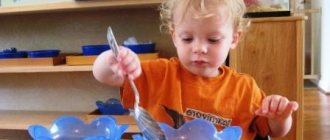Adaptation in kindergarten is the process of a child getting used to the new conditions of his life: the room, the daily routine, teachers and other children around. In kindergarten there are new requirements and rules that you also need to gradually get used to. Some children adapt very easily - they run into the group without tears. They play, have fun and don’t want to go home. Others just can’t tear themselves away from their mother. They cling to her, cry loudly and are afraid to enter the group. What kind of adaptation will be in kindergarten depends on the parents, teachers and the child himself.
Degree of child adaptation
There are three degrees of adaptation in kindergarten: easy, moderate and severe. Which of them will happen to a particular child depends on many factors: relationships in the family, the pedagogical skills of educators, and the characterological characteristics of the child himself.
Lightweight
Easy adaptation to kindergarten takes place in a short time: within 2-4 weeks the baby gets used to kindergarten, is not afraid to go there and happily goes to the group. This degree of adaptation can be judged by the following signs:
- the baby calmly enters kindergarten and group, without crying or hysterics;
- communicates happily with teachers, does not hide from them, is not afraid to look them in the eyes, can calmly tell them about his need at the moment;
- successfully communicates with the guys from the group;
- responds adequately to verbal encouragement or reprimand from teachers;
- if she can already speak, she emotionally tells her parents about what happened in kindergarten today.
Average
The average adaptation of a child in kindergarten takes longer - up to one and a half months. At the same time, the baby cries or gets angry when he goes to kindergarten, does not always want to go to the group, but nevertheless joins the team and a new life, albeit slowly. This level of adaptation is indicated by the following signs:
- the child does not go to kindergarten much and is often sick;
- has a hard time parting with her mother, does not want to let her go, cries for some time after she leaves the kindergarten;
- after a short time he calms down and begins to play with other children;
- complies with the institution's regulations;
- responds adequately to positive and negative statements from the teacher about his behavior and actions.
Heavy
Difficult adaptation in kindergarten is typical for children with high sensitivity, low levels of socialization, or increased aggressiveness. In this case, adaptation can last from a couple of months to several years; sometimes the baby does not adapt to the child care facility and parents have to take him to home education. This degree of adaptation is quite rare. Signs by which it can be identified:
- lack of contact with teachers and peers for more than two months;
- crying, stupor or aggression for a long time after the parents leave - more than an hour;
- refusal to accept the kindergarten routine: does not eat, does not sleep, does not participate in developmental and educational activities, does not play with children;
- tears, fear or aggression in response to the words of teachers.
Ways to overcome difficult adaptation include timely contact with a psychologist, constant contact with the child and teachers, and establishing a trusting relationship with the baby. Sometimes it is useful to take a break from visiting a preschool educational institution for 1-2 months.
Depending on the child’s degree of adaptation to kindergarten, parents and teachers need to build their own ways of interacting with the baby: one just needs to be supported, another needs to be encouraged, and another needs to be pitied. If adults manage to find a suitable behavior strategy, then soon the child’s psychological and physical adaptation to kindergarten will end, and he will go there more calmly.
Emotional portrait of a child during the period of adaptation
Negative emotions
Usually, negative emotions manifest themselves in almost all children who go through an adaptation period. As a rule, a child expresses his condition with a palette of crying: from whimpering to constant crying. Here you can also observe “crying for company,” with which a baby, almost adapted to kindergarten, supports a newcomer who has come to the group. Another manifestation is depression: children become depressed and indifferent to everything.
Fear
Negative emotions are usually accompanied by fear. It is unlikely that you will be able to find a child who has not experienced it at least once during adaptation to kindergarten. The child is afraid of an unfamiliar environment, meeting with teachers and new children, and most importantly, that his parents will forget him when they go to work.
Anger
Against a background of stress, a child sometimes develops anger that bursts out. During the adaptation period in kindergarten or school, children are so vulnerable that anything can become a reason for anger.
Positive emotions
The first days of adaptation to kindergarten or school usually pass without any manifestation of positive emotions: the new environment simply scares him, so the child often turns from a perky, cheerful person into an extremely closed, taciturn and sometimes whiny child. The easier the child adapts, the faster a smile will appear on his face again.
Social contacts
Communication skills can help a child successfully adapt to a new team. But in the first days of being in kindergarten or school, some children also lose this quality. The child can be unsociable, withdrawn, or spend time in “splendid isolation.” As soon as the child is able to establish contact with the group, the problems of adaptation to kindergarten or school will subside - this will be the main step towards completing the adaptation process.
Cognitive activity
Against the background of stress reactions, cognitive activity usually decreases and fades away. Therefore, when children first come to kindergarten, they are often not interested in toys, and, for example, in the first days of school they do not want to meet their peers and find out what is happening around them.
Speech
As a result of stress, a child's adaptation in kindergarten may be accompanied by regression of speech. The baby's vocabulary decreases, and he suddenly goes down several steps, using only simplified or infantile words when speaking. Such speech is a consequence of difficult adaptation of children.
Types of adaptation of children
Types of adaptation in kindergarten also vary depending on what behavior strategy the child chooses. Some cry for a long time at first, and after a couple of weeks they happily go to the group, others at first enthusiastically join in the activities and games, and after a while they just can’t let their mother leave the locker room. What kind of adaptation a particular baby will have depends on his individual characteristics.
Active
Adaptation to kindergarten of this type is most common. In the first two or three weeks, the child feels anxious: he worries when he goes to kindergarten, cries when parting with his parents, and is sad that tomorrow he needs to go to the children again. But soon there are fewer tears, the baby begins to feel safe, and more and more confidently makes contact with teachers and children.
Passive
This adaptation of a child to kindergarten often goes unnoticed by parents. The fact is that the baby goes to kindergarten with practically no problems: he doesn’t throw tantrums, doesn’t cry in the locker room, doesn’t cling to his mother. But things are changing for him that, it would seem, do not apply to kindergarten: sleep and appetite are deteriorating, fatigue increases, and moodiness in the evenings. These symptoms disappear after a few weeks and the child’s condition improves.
Postponed
Adaptation of a child to this type of kindergarten usually greatly disappoints parents. In the first 2-3 weeks, the baby seems to be successfully going to kindergarten: he does not shed tears, does not refuse sleep or food, and has excellent contact with participants in the educational process. But one day the day comes when the child behaves the way children with active adaptation behaved in the initial stages: he cries, does not let go of his mother, does not want to go to kindergarten, does not want to communicate with teachers and play with children. The further process usually takes place according to the type of active adaptation of children to kindergarten.
Failed
This type suggests that the child was never able to get used to it, or the period of adaptation in kindergarten dragged on for years. The child does not calm down with teachers and children after his parents leave, does not comply with the institution’s regime, does not participate in games and activities, and refuses to eat and sleep in kindergarten. This state most often spills over into school: a first-grader has a very difficult time getting used to a new role.
The child’s future life depends on how adaptation went in kindergarten. This determines how he will establish contacts, interact with people, whether he will be independent, self-confident, or anxious, lacking initiative.
Relationships between children and teachers
In kindergarten, children may develop quite close relationships with adults who are not family members, and parents are often afraid that the child will become more attached to the teacher than to them. In reality, there are no facts indicating the possibility of such a development of the situation if the baby experiences a secure attachment to the mother. On the contrary, several studies suggest that the parent tends to be the child's first priority, so if both mother and teacher are present in the room, most babies will prefer to be close to their mother and interact with her.
Where all the prerequisites for this have been created, the child demonstrates towards the teacher the same signs of secure attachment that characterize his successful relationship with his parents: if necessary, he turns to the teacher for consolation in order to quickly receive support from her, willingly spends time with her in games and other activities. The teacher's sympathy often turns out to be especially important at the stage of the child's adaptation to kindergarten. When the child has time to get used to the new conditions a little, the teacher can shift the emphasis to a playful form of communication and direct his support mainly to the newcomer’s research activities and his interaction with other children.
Factors influencing a child's adaptation
An analysis of a child’s adaptation to kindergarten conditions shows that it depends on several factors at once. The more prosperous each of them is, the faster and easier the baby will get used to the new conditions.
Child's age
Adaptation to kindergarten for young children occurs in different ways:
- At the age of one, the baby is very strongly attached to his mother, is not independent, and sometimes does not even know how to walk. These babies endure separation very hard; they cannot calm down for a long time after their mother leaves. They have an insufficiently developed immune system, so they get sick even more often than older children.
- Adaptation to kindergarten at 2 years of age is usually more successful. The child is already more independent, the world around him is gradually becoming more interesting for him than his mother. Therefore, most often the baby quickly gets used to it, gets involved in the routine and interacts with the teachers.
- Adaptation to kindergarten at 3 years old may vary depending on whether the child has already experienced the main crisis of this age. If this period has already passed or has not yet begun, then adaptation occurs easily and quickly: the baby is interested in the world around him, the desire to interact with peers is gradually formed, and he has already become sufficiently separated from his mother. If you bring a child to an institution during a crisis, then adaptation to kindergarten at 3 years old may be delayed, since the stress associated with entering kindergarten is superimposed on the internal negative state.
Health status
How adaptation goes in kindergarten also depends on whether the baby is healthy. If a child has any somatic diseases when entering the group, then it will be more difficult for him to get used to it: in addition to the stress from an unfamiliar environment, he experiences physical discomfort.
A child’s adaptation in kindergarten will be difficult if he has mental or neurological disorders - for example, he cannot tolerate loud sounds or is terrified of contact with strangers. If the baby has any chronic diseases or developmental features, then it is better to immediately inform the teachers about this so that they can create suitable conditions for him.
Degree of psychological development
If the degree of psychological development is too low or too high, the child’s adaptation in kindergarten may have its own characteristics. In the first case, the baby will not keep up with the kindergarten curriculum and will have difficulties with communication and interactions. For children with serious psychological problems, the institution usually draws up an adapted educational program taking into account its characteristics.
Gifted children are often bored with their peers, they cannot find a common language with them, and they are not interested in interacting with each other. Therefore, children with a very high level of mental development have a late adaptation to kindergarten; they take a long time to adapt to children who are different from them.
Level of socialization
How long it takes for a child to adapt to kindergarten, as well as what type it will be, depends on the level of socialization. If, before entering the institution, the child communicated very little with other children and adults, did not stay with anyone except mom and dad, and did not visit playgrounds, then it will be more difficult for him to get used to kindergarten. A large number of other children around, a lack of attention from adults in kindergarten can lead him to a state of stress.
When a child comes to kindergarten who has experience interacting with any children, easily makes contact with them and knows how to negotiate at least on the simplest level, then his adaptation to the kindergarten will most likely happen quickly and easily.
Family composition
The adaptation of a young child to kindergarten sometimes depends on who the child lives with. It is usually the most difficult for those children who are the only child in the family or live with one parent: they have a very strong psychological connection, it is very difficult for the baby to be alone in an unfamiliar place, surrounded by strangers.
Children living in large families, where they are accustomed to staying with different adults, interacting with brothers and sisters, will most likely go to kindergarten without serious adaptation problems. But it also happens differently: an overly active child from a small family gets tired of loneliness and happily runs to kindergarten, and a child who lacks attention in a large family has a harder time getting used to a large group of children.
Child's temperament
Depending on the type of nervous activity, children’s adaptation to kindergarten conditions will also occur differently. Little sanguine children quickly get used to the institution, their peers and teachers, they make good contact, and get involved in activities. It may be more difficult for choleric people: they are explosive, can often conflict, and do not get along with all the guys. At the same time, they are easy-going and also get used to new conditions quite quickly. A phlegmatic person may have two options: either he is very accustomed to home and finds it difficult to adapt, or he indifferently goes to kindergarten, not paying much attention to the changes in his life. A severe degree of adaptation to kindergarten is most often found among melancholic people: they take everything to heart, they are easily offended and upset.
Family atmosphere
If a child goes to kindergarten from a prosperous family in which he feels needed and loved, then his adaptation is easier. He quickly understands that his parents are not leaving forever, and they will definitely take him away, that they will protect him from any adversity and support him in case of failures.
A child living in a family in which they often quarrel, do not notice him, do not listen to him and to each other, and constantly criticize and scold, will find it more difficult to get used to new conditions. On the one hand, due to low self-esteem, he will worry that his parents, who are so bad, may leave him here forever. On the other hand, he will be afraid of criticism in kindergarten, react inadequately to comments and experience difficulties in interactions.
Conditions for successful adaptation of children to preschool educational institutions
Nadezhda Opritova
Conditions for successful adaptation of children to preschool educational institutions
When a child enters a preschool institution, stereotypes are broken: from a familiar family environment, the child finds himself in an unusual environment, fraught with a lot of unknowns:
• Clear daily routine,
• absence of parents,
• different communication style,
• new requirements for behavior,
• constant contact with peers,
• new premises.
All these changes create a stressful situation for the child. Age-related immaturity of the system of adaptation mechanisms leads to mental stress, as a result, sleep and appetite are disturbed, various fears appear, the baby refuses to play with other children, often gets sick, etc.
Adaptation is the process of a person entering a new environment and adapting to its conditions .
There are 2 main criteria for successful adaptation :
*internal comfort (emotional satisfaction,
*external adequacy of behavior
(ability to easily and accurately meet new requirements)
.
adaptation period depends on many reasons:
- on the characteristics of nervous activity and the age of the child;
- on health status;
- on differences in the home environment and the child care facility;
- from the difference in education methods.
Difficulties in adaptation arise in cases where a child encounters misunderstanding and attempts are made to involve him in communication, the content of which does not meet his interests and desires.
There are three phases of the adaptation process :
1. Acute phase or period of maladjustment . It leads to weight loss, frequent respiratory diseases, sleep disturbances, decreased appetite, regression in speech development (lasts on average 1 month)
.
2. Subacute phase or adaptation . Characterized by adequate behavior of the child.
3. Compensation phase or adaptation . It is characterized by an acceleration of the pace of development, as a result, by the end of the school year, children overcome the above-mentioned delay in the pace of development, children begin to navigate and behave calmer.
Stages of adaptation
Stage 1 preparatory.
Stage 2 – the main one.
Stage 3 – final.
stage for :
Parents introduce the child to the kindergarten in advance - to the teachers and children, the group. The teacher lovingly greets the new baby and shows what interesting toys the group has.
The task of this stage is to gradually form new stereotypes in the child’s behavior: to accustom him to new dishes, to fall asleep independently, to get dressed, etc.
II.Main stage:
During the first week, parents bring their baby for breakfast and a walk,
1-2 hours, staying close to him.
The main task of this stage is to create a positive image of the teacher.
III.Final stage:
The child attends kindergarten for 3 hours or more, then is left to sleep. First of all, the baby’s mood, well-being, appetite are normalized, and last of all, sleep. The child gets used to attending kindergarten within one to two months.
Any adaptation occurs at two levels:
*Physical
*Psychological
On a physical level, the baby needs to get used to:
* To a new regime - a certain, given rhythm of life, new loads (you need to sit, listen, fulfill requests)
;
*The need for self-restraint;
*Lack of privacy;
*New food, new premises, etc.
On a psychological level, the baby needs to get used to:
*To the absence of a significant adult (mom, dad, etc.)
;
*The need to cope with your problems alone;
*A large number of new people and the need to interact with them;
*The need to defend your personal space.
In order for the adaptation process to be more successful , based on the provisions of the Federal State Educational Standard, the preschool educational institution must work in three areas:
1. Creating an emotionally favorable atmosphere in the group;
2. Work with parents;
3. Correct organization of the spatial subject-development environment: zone of cognitive activity, artistic zone, constructive-play zone.
Creating an emotionally favorable atmosphere in the group:
It is necessary to form a positive attitude in the child and a desire to go to kindergarten. This depends, first of all, on the ability and efforts of the kindergarten staff to create an atmosphere of warmth, comfort and goodwill in the group. If a child feels this warmth from the first days, his worries and fears will disappear, and adaptation .
During the adaptation , it is necessary to temporarily maintain the child’s usual parenting techniques, even if they contradict the rules established in kindergarten: before bedtime, you can rock the child, give him a toy, sit next to him, and tell him a fairy tale.
Under no circumstances should you force feed or put to sleep, so as not to cause and consolidate for a long time a negative attitude towards the new environment.
Imagination activities are important for children during this period , so that the child can express his feelings on paper, since many 2-3-year-old children do not speak yet. A drawing corner with free access for children to pencils and paper will solve this problem.
Organization of a spatial subject-development environment: zone of cognitive activity, artistic zone, constructive play zone.
According to the requirements of the Federal State Educational Standard, “the developing subject-spatial environment must be content-rich, transformable, multifunctional, variable, accessible and safe.”
We pay special attention to the safety and accessibility of the development environment. All toys are stored on shelves to which children have free access and can take them at any time.
It is necessary to have a sports, artistic and aesthetic corner in the group.
The subject-development environment in our kindergarten ensures maximum realization of the educational potential of the space for the development of young children of children and adults , motor activity of children , as well as the opportunity for privacy.
Any child experiences discomfort from the size of the group room and bedroom - they are too large. It is better to place furniture in such a way that it forms small “rooms”
, in which children feel comfortable.
“solitude”
in the group . Plants and the color green in general have a beneficial effect on a person’s emotional state.
There should be games to relieve emotional stress in children during the adaptation period .
Treating the child kindly and periodically holding the baby in your arms gives him a feeling of security and helps him adapt . The child wants his mother to be nearby all the time, so it is very good to have a “family album”
with photographs of all
the children in the group and their parents.
Working with parents
A necessary condition for successful adaptation is the coordination of the actions of parents and educators, the convergence of approaches to the individual characteristics of the child in the family and kindergarten.
Even before the child enters the group, educators should establish contact with the family. It is difficult to immediately find out all the habits and characteristics of a child, but in an introductory conversation with parents, you can find out what the characteristic features of his behavior, interests and inclinations are.
Therefore, the teacher’s task is to reassure, first of all, adults: invite them to look around the group rooms, show them a locker, a bed, toys, tell them what the child will do, what to play, introduce them to the daily routine, and discuss together how to ease the adaptation .
Parents must be sure that the teacher will fulfill their requests regarding the child’s food, sleep and clothing, and that all medical and hardening procedures will be carried out only with their consent.
In turn, parents should listen carefully to the advice of the teacher, take into account his consultations, observations and wishes. If a child sees a good, friendly relationship between his parents and educators, he will adapt much faster to a new environment .
Collaboration between the teacher and parents during the adaptation
Working with teachers, a reminder on organizing the pedagogical process during the period of adaptation of the child to kindergarten
*During the adaptation , an individual regimen is established for each child, taking into account the recommendations of a doctor, psychologist, art. teacher, but gradually all children are transferred to the general regime.
*During the adaptation period, it is necessary to take into account all the child’s individual habits, even harmful ones, and under no circumstances re-educate him.
*It is necessary to prepare a subject developmental environment similar in content to the early age group
*Adults should organize emotionally rich communication with children.
*Periodically turn on quiet, not loud music, but strict dosage and definition during playing is required.
*The best cure for stress is laughter. It is necessary to create situations so that the child laughs more. Using fun toys, cartoons, unusual guests are invited - a bunny, a fox, clowns.
*It is necessary to eliminate the monotony of children’s by defining themed days.
*Exclude intellectual and physical overload.
*It is necessary to look closely at the individual characteristics of each child and try to understand in time what is behind the silence, calmness, and passivity of some children .
*The indispensable rule is not to judge the child’s experience and never complain to parents about it. All the child’s problems become professional problems for the teacher.
*Daily conversation with parents about the child’s progress .
The most important task that kindergarten workers and parents must solve during the adaptation is to make kindergarten desirable for the child.
Be patient, understanding and discerning.
And very soon the kindergarten will turn into a cozy, familiar and familiar world for the baby!
Stages of child adaptation to kindergarten
There are three stages in a child’s adaptation to kindergarten:
- Spicy. The baby is in constant tension, feels anxious, cries, is capricious, and sometimes even throws real tantrums.
- Moderate. The tension gradually weakens, the child begins to react more calmly to parting with his parents, and calms down faster after they leave. Appetite and sleep are gradually improving.
- The compensated stage is characterized by stabilization of the baby’s condition. He joins in communication with peers and teachers, begins to actively participate in games and successfully learn new things within the walls of the institution.
Useful skills for a kindergartener
How to make it easier for a child to adapt to kindergarten? One of the most important points is independence in as many areas of his life as possible. The more the baby can do, the easier it will be in the garden for both him and the teachers.
- Dress and undress independently, at least partially. If a child is taught to do this with minimal help, then he will not have to sit and wait until he is changed, no one will scold him for lack of independence, he will learn to take responsibility for his things.
- Eat on your own. The child must master the ability to hold a spoon and bring food to his mouth before he goes to kindergarten. Otherwise, he risks remaining hungry throughout the day or he will have to wait until his turn comes and he is fed.
- Refusal of diapers. It’s good if, before entering kindergarten, the baby can use some word to inform adults about his need to go to the toilet. In this case, he will have a minimum of wet pants in his locker when his parents arrive.
- Interact with children and adults. Don’t be afraid of anyone, don’t offend anyone, be able to negotiate on a simple level. Communication in kindergarten is inevitable, and in the absence of skills, serious problems with communication and adaptation arise.
- There are different foods. It is difficult for those children who are accustomed to eating only pureed food or semi-finished products to get used to kindergarten food.
Recommendations for parents on how to make separation from their baby easier
Information for parents about adaptation to kindergarten is often located on stands in the locker room and issued in the form of reminders and booklets. It will be good if parents prepare and set up their child for new living conditions long before he appears on the threshold of the group.
Necessary actions
- Come up with your own farewell ritual with your baby, which will instill in him confidence that his mother will definitely return. This can be any simple action: the phrase “I love you,” a kiss on the nose, or a firm handshake. Always. When leaving the baby with one of the other adults, perform the same action so that the child remembers it. By saying goodbye in this way, the child will more easily part with his mother in the preschool locker room.
- About six months before going to kindergarten, begin to involve other adults in communicating with the child, so that he has experience of parting with his mother and interacting with other adults. You can start with them communicating in the presence of mom, and then start being away for longer and longer periods of time.
- Gradually leave the baby alone in the room while the mother is out of sight. Sometimes it’s worth inviting him to play on his own, without the participation of adults - this skill will also be needed in kindergarten.
- Try to form a positive self-esteem and ideas about yourself for the baby: tell him how smart, independent, cheerful and sociable he is. At the same time, it is necessary to avoid statements that the child is unsociable, capricious or angry.
Unnecessary actions
- Never leave your child when he is distracted. In this situation, he is very scared that his mother has disappeared to God knows where. Next time he will try with all his might not to let his mother leave him even one step.
- Do not try to leave the child alone at home, even going to the store located in the neighboring house. Firstly, this will increase the baby’s anxiety level, and secondly, in just a few minutes he can find himself in danger in his own apartment.
- There is no need to buy your child something tasty or toys every time after a separation: if he develops an understanding that something material awaits him after the separation, such purchases will have to be made every day when the child goes to kindergarten.
Tips from Komarovsky for parents on how to adapt their child to kindergarten
A famous doctor also speaks about the adaptation of a young child in kindergarten. Evgeniy Olegovich believes that successful adaptation to a preschool educational institution is one of the conditions for the harmonious development of a child. He gives the following advice to parents regarding their child's adaptation to kindergarten:
- Do not go to work on the same day that your child goes to kindergarten for the first time. Komarovsky believes that adaptation in kindergarten will be better if the mother has a few weeks left to sit with the baby for a few days if he is unwell, without creating problems for himself at work.
- Getting used to kindergarten is better in winter and summer; during off-season periods there is a higher probability of going on sick leave, going to kindergarten for only a few days. In this case, after the illness, adaptation in kindergarten, according to Komarovsky, will begin anew.
- It is mandatory to prepare the immune system for encounters with new viruses and bacteria: harden yourself, eat fresh fruits and vegetables to fortify the body, walk more often and longer.
- According to Komarovsky’s advice, adaptation in kindergarten will be easier if at its initial stages you lower the level of demands on the baby: allow him a little more than usual, be more lenient towards his whims and requests.
Adaptation of parents in kindergarten. Tips for parents
First of all, understand for yourself - is kindergarten really necessary for your child? “Everyone drives, and we will”, “He needs communication”, “Well, for some reason he is there” and so on are not reasons. Psychologists have been saying for quite some time that preschool is not a mandatory stage in a child’s development. He can develop well at home, interact with children on the playground and in clubs, and subsequently show excellent results at school. If it’s time for you to go to work, that’s a different question.
Why is this so important? No one can predict the baby’s reaction to new conditions and the new environment in which he will find himself. Even the most communicative children can experience difficulties. But when there is no clear goal and understanding of “why” on the part of the parents, this can affect the adaptation process as a whole.
What to do if adaptation to kindergarten has already begun
The rules for a child’s adaptation to kindergarten, if he has already started going there, should also be followed so that the adaptation is as traumatic as possible for the baby. It is better to draw up a plan for a child’s adaptation to kindergarten in advance, after discussing it with teachers and, if necessary, with a psychologist.
Firstly, you cannot bring your baby to kindergarten for the whole day at once. It is better if the habituation begins with joint walks: during them, the baby will have time to get to know the teacher and the children on neutral territory, being next to his mother. Having realized that the teacher is a safe person familiar to the mother, the baby will go to his group more easily. When you go to a group, you need to start with a two-hour stay.
Gradually, you can increase the time, but do not force events. This applies to adaptation to kindergarten at any age - both 2 and 4 years old. Secondly, it is important to show sincere interest in what the baby did in kindergarten, how his day went. Even if the baby is 2 years old, the child’s adaptation to kindergarten will be easier if he sees that his mother is really involved in his new life.
Thirdly, regularly maintain contact with teachers so that you can easily understand how adaptation is going in kindergarten. They keep special development maps that show the progress of addiction.
Fourthly, especially for those children who have problems adapting to kindergarten, it is worth limiting strong emotional experiences, both negative and positive, for the period of adaptation.
Parents also have to adapt to kindergarten: parting with a baby who has only been at home for a long time, containing his emotions, worrying about the child’s condition. The calmer mothers and fathers behave and feel, the sooner the baby will feel safe within the preschool walls.
Adaptation to kindergarten conditions
Adaptation implies the gradual adaptation of the baby’s body to conditions unknown to him. The younger the child, the more time he needs for this and the gentler the process itself should be. Calmness, understanding of adaptation mechanisms and lack of haste in this matter will help both the child and parents avoid many problems, including those with the little person’s health.
There are general rules for the adaptation period, which kindergarten teachers will certainly tell you about. To summarize, the child must go through the following stages: first, together with a loved one, join, for example, a walk with children, then get acquainted with the situation in the group, then the child is left alone for a short time, later until lunch, and only then stays to sleep and for the whole day. The number of days for each stage is adjusted by the teacher depending on your specific situation.
Erroneous actions to adapt a child to kindergarten: a reminder to parents
Sometimes mothers and fathers, trying to help their baby, make mistakes that make adaptation to kindergarten difficult. What should you not do during this difficult period?
- Compare your child with others, especially out loud. All children have different levels of adaptation to kindergarten. Some calmly part with their parents and play, others cry, not wanting to let them go. Both options are normal, so there is no point in comparing. This can only cause offense to the child.
- Deceive. According to the recommendations of psychologists, during the period of adaptation to kindergarten, you should not tell the child, when saying goodbye, that mom is only going to the store for 5 minutes, and will return if you plan to leave him for a longer time. In this case, the parents undermine the child’s trust; he feels betrayed.
- Punish in kindergarten by leaving them there for a longer time for any offense. In this case, love for kindergarten will only weaken. Instructions for parents on adaptation usually advise, on the contrary, to say only good things about the institution and convince the child that only the most wonderful children go there.
- Bribe with material objects: toys or something tasty for the baby to stay in the garden. There is a risk that in the future the child will blackmail his parents, demanding reinforcement from them every day.
What should you never do?
- You cannot punish or get angry with your baby because he cries when parting in kindergarten or at home at the mere mention of the need to go to kindergarten!
- You can't be intimidated by kindergarten.
- You cannot speak badly about the teachers and the kindergarten in front of your child.
- You cannot deceive your child by saying that you will come very soon, but in fact you will pick him up only in the evening.
Sometimes it is enough to change groups or teachers, and the child begins to love kindergarten. Carefully choose the person whose group your baby will go to.
Adaptation to kindergarten is a difficult period for both the baby and the mother. We figured out how to make it as simple as possible for the child, and next time we’ll talk about how a mother can survive adaptation in kindergarten.
Personal practice with children adapting to kindergarten
- Arseny came to kindergarten at the age of three and a half years. He was very attached to his mother, screamed loudly upon arrival at kindergarten, lay on the floor and refused to get up - this was the case from the first day. A few days after the first visit, my mother made the main mistake: she entered the group with him and began to play with him. When he was distracted, she quickly ran away from the kindergarten. Realizing that his mother was missing, Arseny began to become hysterical: the teachers could not calm him down, he threw toys at the children, at the teachers, screamed, and beat the floor with his hands and feet. The teachers had to turn to a full-time psychologist. Seeing a new person in the group, the kid froze. Taking advantage of the moment, we managed to get him to talk. He answered simple questions: what is his name, which of his toys does he like, what does he like to do. The boy was very tense physically and psychologically; it was clear that it was difficult for him to be in the group. Therefore, the psychologist took him to his office and tried to relieve emotional stress with the help of games in the sand, modeling and drawing. Additionally, consultations were held with teachers and the mother. The child attended classes for 3 months, during which the psychologist first relieved emotional stress and then gradually worked to adapt it to the group.
- There was a three-year-old girl, Katya, with a dysfunctional family situation: her mother gave birth to her at the age of 17, and after that, leaving the baby with her grandmother, she left for another city. Katya saw her no more than once every six months. In addition to Katya, the grandmother was in the care of the grandfather without both legs. The woman tried her best for her granddaughter. She treated her with love, but the girl apparently did not have enough attention. From the first day she went to kindergarten very calmly: she didn’t cry, she immediately ran to play with the kids and toys, and when her grandmother came for her 2 hours later, she didn’t want to leave. The next day, the baby voluntarily stayed for an afternoon nap. A couple of weeks later, for several days, she was cranky when she arrived at kindergarten, but quickly calmed down and, ultimately, adapted well.
Forms of adaptation to kindergarten depend on many factors: the condition and personal characteristics of the child, family situation, level of socialization and much more. Parents can help the baby by teaching him independence in advance and not rushing things in the process of getting used to it. If you listen to teachers and other preschool teachers, and also listen to your child, then his adaptation will be easy and without much stress.










